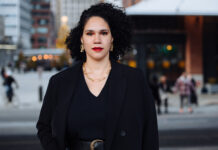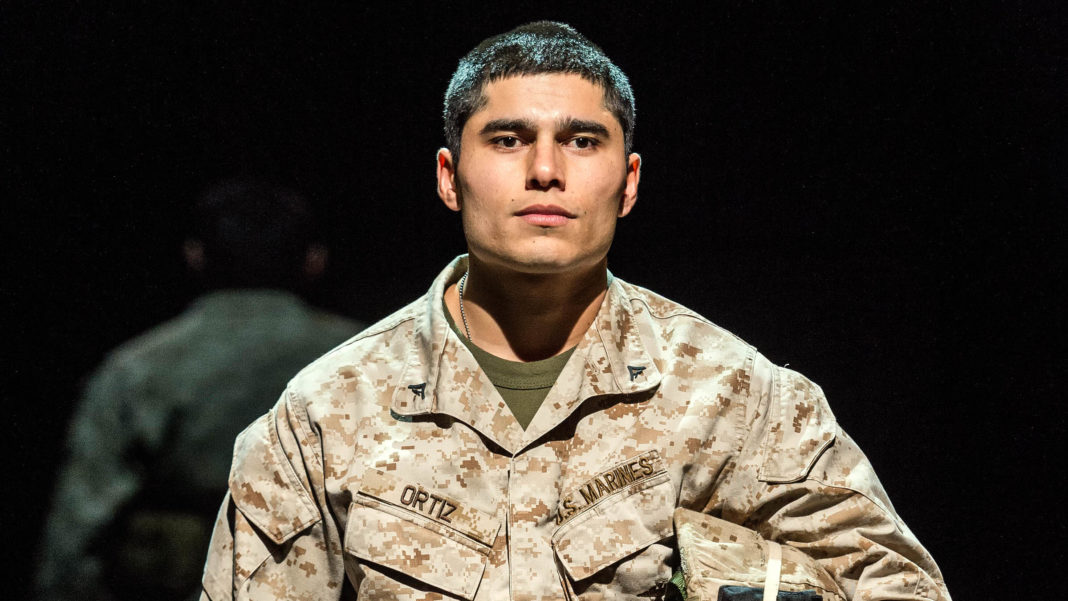This is the first in a trio of interviews with each actor who plays “Elliot” in the trilogy of plays by Pulitzer Prize winning playwright Quiara Alegría Hudes. This interview is with Peter Mendoza who plays Elliot in Elliot, A Soldier’s Fugue which is in its final week at the Kirk Douglas Theatre in Culver City. Hudes was inspired to write this trilogy based on the experiences her cousin, Elliot Ruiz, had serving in Iraq.

In an interview Quiara refers to her cousin as being similar to Will Smith’s character in The Fresh Prince of Bel-Air. Is that how you see him, particularly as written in the play?
I see Elliot just as a very charming, socially adept, very driven person. He always has a smile on his face. He’s just slick. Life doesn’t bother him. He has life at his fingertips. He’s just young and full of life and very youthful. When I met him I would never have known he’d gone to war.
You looked at youtube videos of Elliot Ruiz as part of your research. This was before you met him. What did you glean from the videos you saw about the man who inspired your character?
I knew what type of person he was. He was promoting his movie to his high school and he was talking about his leg injury and how doctors told him he’d be walking with a cane for the rest of his life. He wasn’t going to let this physical cripplement, both physically and mentally, stop him from being who he knows he is. He was just so confident that he could do it because he knew the only thing holding him back was mental. He wants to give back and he wants to help. You can more than what society thinks you are. Veterans are put into this bubble that they are all hurting or unstable. That’s not true. They’re just as human as we are and deserve the same, if not more, respect because of their sacrifice. That’s why the play is so relevant. War is not good. The damage it does to the person himself and his family and how they have to deal with it…it’s ugly.
Did you read the two plays that follow Elliot, A Soldier’s Fugue and did that help you in creating your performance?
I actually read Water by the Spoonful first. I went up for it and didn’t get it. Then I went up for Elliot. The whole trilogy is a fugue. It’s a melody on top of another melody on top of another melody. You are taking someone out of their environment and it’s the loss of one’s self and trying to find himself. The first play establishes what happens to this kid when war comes knocking. The second is about loss and addiction and recovery. Then you have the third one which is redemption. I would love to play the other [Elliot’s]. That would be so awesome.

What, if any, personal connection do you have to Elliot and his story?
In my life my mother was homeless and was pregnant with me and living on the street. She found this family in East LA that took us in and raised me and my little brother. They took in four children out of the goodness of their hearts and raised them to believe that they could do whatever they wanted as long as they worked hard. I didn’t know about gangs and drugs because I was raised by this family that kept that from me. This woman raised me and taught me ‘don’t be the thing that makes it worse.’ She passed away on October 1st.
But the parallels in Elliot and myself are very clear. We are the same guy. If I had enlisted I’d be the same. In order to do justice to this character, I had to play myself and put myself in that situation. How would I react given the language and the story and how would I move in that trajectory? A lot of what you see on stage is not me playing a character, it’s me being my sincere self.

Three generations of Elliot’s family are depicted in Elliot: A Soldier’s Fugue, Elliot, his father and his grandfather. All of them have been or are in the military. Yet you don’t have dialogue with the other actors. How do you create that sense of family on stage without talking to each other?
There is this bond that they are connected, but also they are connected ways that are unspoken. This bond doesn’t need words. You know that bond they have with each other. They need to make each other proud, to be thankful for having another chance to get to know more about your father and to know you love him and you are thankful for him. And the same for the other that he got to raise such an independent strong man. His father taught him how to be a man in this society and what the responsibility is in that. I’m sure many people going in watching this play can understand the bond between Elliot and his father. That’s what makes this story more relevant – people have someone like that. They know somewhere in the play, ‘I’ve been through that.’
Photo Credit: Craig Schwartz











